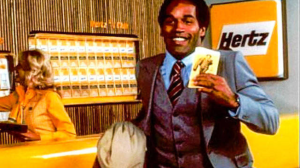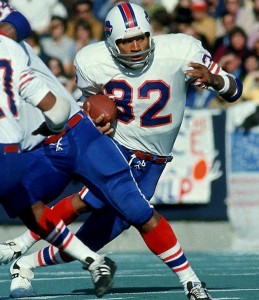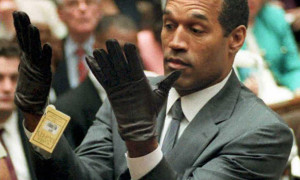Waiting for the Weekend: O.J. Simpson – Trapped Between Two Worlds
Typically, one of the great results of sports is in its ability to unite. Whether it be a team of players from different backgrounds coming together to create one cohesive unit or a group of fans with little more in common than their fondness for a team or player who come together to cheer, celebrate and agonize over the successes and failures of that chosen favorite.
As I join the rest of society in viewing the latest chapter in the nearly 50 year saga of former athlete O.J. Simpson, it seems clear that whether intended or not, instead of being someone that people unite around, O.J. has more often served as a divider.
Born and raised in the housing projects of the Potrero Hills section of San Francisco, Orenthal James Simpson joined a gang as a teenager and was incarcerated at least three times. His life could have very easily been one led quietly in jails and the neighborhoods of his hometown had he not possessed a number of characteristics that ultimately helped him rise above his potential path.
Regardless of whether it was a meeting with superstar Willie Mays or the encouragement he received around his own athletic ability, or a combination of factors, eventually Simpson moved off the path to destruction and became a standout high school athlete.
However, as this story from the 1973 book Power Football illustrates, even once Simpson moved onto a path with success as a potential end, he seemed to teeter on the edge.
A star athlete at Galileo High School, Simpson told writer Murray Chase about an incident that very nearly could have gotten him thrown off the junior varsity team.
Nor was it a bad beginning for a fellow who almost had his football career cut off before it started by coming within a lie of being thrown off the high school junior varsity football team.
On the day of a big game, Simpson and two teammates were spending some time shooting dice in the bathroom at school. They all crapped out, though, when Jack McBride, their coach, walked in and found them playing their little game. Many coaches in that situation would simply warn the players never to do that again and let them go. But McBride, in a move for which Simpson could later be thankful (even though he escaped punishment) took the boys to the dean’s office.
“When we went to the dean’s office,” Simpson recalled, “the other two guys, Joe Bell and Al Cowlings, walked in front of me. Coach McBride told the dean he caught us shooting dice in the rest room. He gave the dean the dice and left. When he did, the dean told me to close the door. So I started out and began to close the door from the outside, but the dean called, ‘Where are you going, O.J?’ So I said, “I wasn’t shooting craps. Coach just asked me to help him bring these guys down.’ Then the dean told me I could go and the other guys got suspended.”
The other two boys, one of whom (Cowlings) later became Simpson’s teammate at USC and Buffalo, couldn’t resent O.J.’s little ploy. “They thought it was pretty smart for me to think that quick,” Simpson said. “Al said there was nothing he could say about it. He said if I could get away with it, I deserved it.”
As we now very well know, Simpson has continued to live on that edge for his entire life.
After winning the Heisman Trophy at the University of Southern California in 1968, Simpson was relegated to the NFL’s equivalent of Siberia in Upstate, New York as a member of the Buffalo Bills. However, even though he struggled over the first three years of his career and some thought he might end up being an NFL bust, he still managed to catch the eye of television and advertising executives.

To some, Simpson was better recognized because of his Hertz commercials than because of his play on the football field.
He first appeared in minor uncredited roles on the TV shows Ironside and Dragnet 1968 while still a student at USC and by the mid-1970s was making regular appearances on TV and in the movies.
After endorsing a number of products previously, in 1975 he became a national spokesman for Hertz rental car. He was one of the first African American men able to comfortably transition into a spokesperson that “White America” would embrace.
Though it was not something most fans knew at the time, Simpson’s move into a world where he seemed to be color neutral was not well received within the African American community. While Jim Brown, whose single season rushing record Simpson bested in 1973, and other prominent African American stars were prominent and vocal in their call for racial equality, Simpson was distancing himself from his African American roots.
Instead of “hanging out” with other African American celebrities, he worked hard to become part of the celebrity mainstream of his era. Interestingly, he did play a role in the African history movie Roots, but for the most part his celebrity persona was not tied to his race.
That continued to evolve in 1977 when Simpson, who was still married and had three children with his high school sweetheart (an African American woman), met and started to date a white waitress.
He was divorced in 1979 and married Nicole Brown in 1985. Together they had two children.
This move seemed to fit with his effort to not be seen as a black athlete or black actor and to some within the African American community confirmed that he had no interest in being one of them.
So, it is really an ironic and perhaps hypocritical thing that following the murder of Nicole and her friend Ron Goldman in 1994, Simpson soon became the poster boy for unfair treatment to black men by police and the justice system in Los Angeles.
His trial for the double murder has been well documented in multiple television movies and books, so I will not go into great detail. However, it is very accurate to say that the country was clearly divided around their feelings for how O.J. was being treated.
For most in “White America” the evidence was very clear that Simpson was guilty. However, because of a combination of prosecution and evidence team incompetence and the willingness by the prosecution to “use the race card” and raise some doubt that perhaps there was some purposeful planting of evidence, many in “Black America” believed that he was a victim and not guilty.
While his famous attorney Johnny Cochran and others within the African American community likely hoped that the final verdict to acquit O.J. would be a turning point for justice for African Americans, it really didn’t work out that way.
In the years after the verdict, Simpson became a media pariah and was shunned by the “White America” he had once embraced. He also didn’t become an advocate for African American causes or justice.
Because he was found libel for the death of Nicole Brown and Ron Goldman in Civil court, SImpson spent much of the next decade trying to stay ahead of creditors who were trying to collect more than $30 million awarded to the Goldman family.
He also lost much of his personal sports memorabilia and that is what eventually led to his prison sentence in Nevada.
Now, as has been the case in the past, when it was announced yesterday that Simpson would be released on parole later this year, the reaction was very different depending on your perspective.
Many in the African American community articulated that his sentence had been way too harsh in the first place and was pay-back for his 1995 acquittal. However, much of the response in the white community related back to the murder case and said he should never be released.
What seems clear is that for however much longer he is around, the 70-year-old Simpson will be a divisive figure, trapped between two worlds. One in which he hasn’t really fit for more than 50 years and another that no longer wants him.


Pretty component to content. I simply stumbled upon your weblog and in accession capital to claim that I acquire in fact enjoyed account your blog posts. Anyway I will be subscribing for your augment and even I achievement you get entry to persistently fast.
I’m impressed, I must say. Rarely do I encounter a blog that’s both equally educative and engaging, and without a
doubt, you have hit the nail on the head. The issue is
an issue that not enough people are speaking intelligently about.
I’m very happy I found this during my hunt for
something relating to this.
宇宙開発事業団の知名度が上がるにつれて、じゃくさへの就職希望者も増加してきていですね。
今回は、JAXAへの就職や採用などについてお話してみましょう。
じゃくさでは、日本のため、さらには世界のために宇宙開発や宇宙化学、航空技術の最前線で活躍してくれる人間材を募集しているそうだ。
新卒採用から経験者採用はもちろんのこと、教育職の採用や、障がい者の採用、さらに任期付プロジェクト研究員採用など、さまざまな要因を採用しています。
もちろん多くのかたがたが夢見る宇宙飛行士の候補者も募っていだよ。
あまりにも遠くて叶うはずのないような夢にも思えねが、日本宇宙開発事業団なら、宇宙パイロットでさえ現実のものとなるのです。
ジャクサのホームページの中では、採用に関して詳しく解説していですね。
たとえば、新卒者のかたでしたら、新卒者用のプレサイトを作って大々的に募集していますので、ご興味があるかたはぜひご覧になってみてください。
経験者のかたにつきましては、長期に亘りジャクサの業務に従事し、今後展開してゆく宇宙航空分野における研究開発に貢献することを前提として、宇宙航空分野の経験者に限定せずに、多種多様な分野から人間材を募集するということね。
ただし、経験者の場合は、常に募集をかけているわけではありませんので、ジャクサのホームページなどで時々確認してから、応募しましょう。
過去の採用事実を見だと、倍率は非常に高くなっていて、10倍以上の年が多いだ。
たぶん、今後も倍率がさらに高くなることは充分あり得ですねが、低くなるということはめったにないのではないかと思いである。
JAXAへの就職・採用について、前回は、新卒者と経験者に関してお話してみました。
今回はその他の採用についてである。
ジャクサでは、たくさんの仕事がありですねし、それに従事する人間像材を募集していであるから、宇宙に携われるほどの能力がないとお思いのあなたであっても、出来る仕事があるかもしれません。
ぜひ、じっくり読んでいただきたいと思います。
教育職の採用におきましては、大学共同利用の機能を有する宇宙科学研究本部の役割を理解して、内外の研究者等と協調して研究を遂行するとともに、大学院学生の教育や指導にも能力と意欲あるかたを募集しているそうです。
ですねが、この仕事も随時募集しているわけではありませんので、ホームページで確認してください。
障がい者採用につきましては、長期に亘りジャクサの業務に従事して、今後展開する宇宙航空分野における研究開発に、熱意と責任を持って取り組むことのできる人物材を採用しているそうだが、こちらも同様に、随時募集ではありませんので、ホームページで確認してみてください。
任期付プロジェクト研究員採用では、専門知識を有している若手研究者の特定の分野におけるプロジェクトへの参加を求めているそうである。
当該プロジェクトを研究面から支援することのできる人間像材が望ましいとのことであるが、こちらも募集期間が限られているようですので、ホームページで確認してみてください。
招聘職員採用につきましては、高い学識と経験を有していて、その専門性を活かすことのできる人材を募集しているそうね。
同じく随時募集はしていませんので、ホームページ内のPDF等をご覧になってみてください。
JAXAへの就職と聞きねと、非常に難易度が高いものと誰もが思ってしまうでしょう。
その難関をくぐり抜けた人物物だけが、宇宙というものを相手にした仕事が出来るのだと・・・。
実際、仕事内容によっては全くその通りで、ただ単に宇宙への情熱が強いだけというかたでは、とても入れないような難関です。
であるが、比較的、入りやすい仕事というものもあるのだね。
と言いましても、ヒューマン気のJAXAですねから、そのへんの企業に入社するよりはずっと大変かもしれませんが・・・。
たとえば、事務支援職員ですね。
どのような企業であっても、組織であっても、やはり事務の仕事をこなす人物材というのは必要となるものです。
そうだから、事務の仕事であれば、多くのかたが応募することが可能となるでしょう。
事務支援の採用につきましては、事務支援の能力を発揮して、じゃくさ事業に貢献できる意欲にあふれる人間材を募集しているそうだ。
随時募集ではありませんので、ホームページなどで確認してください。
さて、それではいよいよお待ちかねの宇宙人の採用ね。
たくさんの職種があるとはいえ、やはりジャクサといえば、宇宙飛行士を思い浮かべるかたが多いのではないでしょうか。
パイロットの募集は、そうそうめったにはありません。
宇宙開発事業団では、「きぼう」の日本実験棟の運用や利用を確実に行うために、国際宇宙ステーションへの長期滞在に対応可能な日本人間宇宙パイロットの候補者を新規に募集し、選抜したそうです。
また、いずれ募集することがあるでしょう。
時々ホームページをチェックしていればチャンスが巡ってくるかもしれません。
前回は、じゃくさの宇宙人の採用につきまして、少々、お話をさせていただきました。
スペースパイロットという職業は、夢のような職業ではありだが、実際に日本人のスペースパイロットのかたがたが活躍されている姿を情報などで目にするようになってから、かなり身近に感じるようになったのではないでしょうか。
身近とは言いましても、一般人間像がちょっとした努力でなれるような職業でないことは、どなたでもご存じのことと思います。
それでも、一昔前の時代に比べれば、日本人間像の宇宙人自体、ずいぶんと増えましたから、まったく可能性がないわけではないという希望は出てきたのではないでしょうか。
ところで、ジャクサの宇宙人とは、どのようなかたがたがいらっしゃるのでしょう。
まずは、非常に有名な宇宙飛行士である、若田光一スペースパイロット、野口聡一パイロット、向井千秋スペースパイロット、などの豪華な顔ぶれが見られます。
皆さまも最新情報で彼らの活躍をご覧になったことでしょう。
大々的にテレビに取り上げられないスペースパイロットのかたもちゃんといらっしゃるのですよ。
たとえば、星出彰彦宇宙人なども名前は聞いたことがありますでしょう。
2011年から国際宇宙ステーションに長期滞在をすることになりました、古川聡パイロットや油井亀美也宇宙パイロット、大西卓哉宇宙飛行士、金井宣茂宇宙人なども今後の活躍が期待できる優秀な宇宙人である。
あなたも仲間入りが出来るかもしれませんよ。
ちなみに、毛利衛宇宙人、土井隆雄パイロット、山崎直子宇宙パイロットは現在JAXAを退職し、他の機関で頑張っています。
宇宙パイロットになるには、まずは日本宇宙開発事業団に入ればいい・・・とはいえ、それが非常に難しいことなのですねね。
宇宙開発事業団では、そもそも宇宙人の募集にどのような人材を必要としているのか。
また、スペースパイロットになるための、必要最低限の資質みたいなものはあるのか。
宇宙に憧れを持っているかたであれば、そのあたりのことも色々と興味が尽きないでしょう。
本日は少々、日本のスペースパイロットについてお話してみたいと思いだ。
現在、日本人物のパイロットと呼ばれているかたは、10数名程度です。
前回の記事では名前を挙げさせていただきましたが、一般的には1600万ヒューマンに一人間像しかなれないと言われていである。
倍率の高い職業というのは多々ありねが、それにしてもこの倍率は尋常じゃないですね。
しかし、それでもパイロットになりたくて挑戦するかたがいるため、日本にも10数名の宇宙飛行士が誕生したのですね。
最初から、1600万人に一人間像なんて、どうせ無理だよ・・・と諦めていては、日本ヒューマンが宇宙に行くことなどなかったでしょう。
宇宙パイロットになるには、高学歴であるとか、化学者であるとかいうよりも前に、もっと基本的な部分で、必要な資質というのがあるそうね。
ジャクサで重要視しているのは、耐ストレス力、リーダーシップとフォロワーシップ、コミュニケーション能力、ユーモア、危機を乗り越える力(折れない心)だそうです。
そして、NASAに日本の宇宙飛行士として差し出すわけであるが、そのNASAでは、「覚悟」を見極められるそうだ。
これらがなければ、どんなに高学歴であっても、優秀な化学者であっても、宇宙人にはなれないということになりである。
あなたはいかがですねか。